EU 'worried' by UK's Irish border proposals
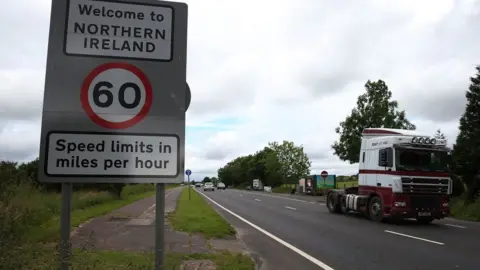 PA
PAThe EU's negotiator says he is worried by the UK's post-Brexit proposals for the Northern Ireland border.
Michel Barnier said the UK was asking for EU laws, its customs union and single market to be suspended at a "new external border".
He said the UK wanted Northern Ireland to be a "test case" for future customs arrangements with the EU.
The UK said both sides were "closely aligned" in what they wanted to achieve.
Northern Ireland is the only part of the UK that will share a land border with an EU state after Brexit.
The impact of Brexit on Northern Ireland and the Republic of Ireland is one of the key issues being discussed in the early stages of UK-EU negotiations.
Fears have been raised that a return to border checks could undermine the Good Friday peace agreement and damage the economy.
The UK - which plans to leave the EU's customs union - has said it wants an "unprecedented solution", avoiding physical checks at the border.
Instead, the government is arguing for a wide-ranging exemption under which small and medium-sized businesses would not have to comply with any new customs tariffs.
Citizens' rights
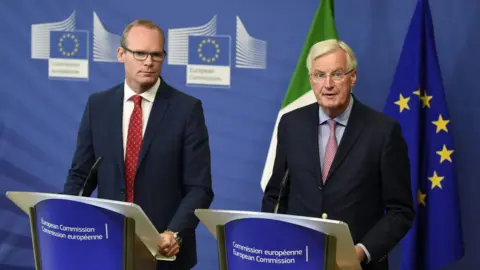 AFP
AFPUnveiling the EU's position, Mr Barnier said: "What I see in the UK's paper on Ireland and Northern Ireland worries me."
He added: "Creativity and flexibility can't be at the expense of the integrity of the single market and customs union.
"This would be not fair for Ireland and it would not be fair for the European Union."
Mr Barnier said the peace process should be preserved, the common travel area between Ireland and the UK protected and that there should be no return to a "hard border", all of which the UK has also said it is seeking.
"Irish citizens in Northern Ireland must continue to enjoy their rights as EU citizens," Mr Barnier continued, calling for the UK to come up with a "unique" solution.
As the UK had chosen to leave the EU, it was its responsibility to come up with solutions, he said.
UK response
The UK government, which released its own position paper on Northern Ireland last month, said there was now a "good basis on which to continue to make swift progress" on the subject.
It welcomed the EU's view there should be no "physical infrastructure" at the border, but added that "unilateral UK flexibility will not be sufficient to meet our shared objectives".
Brussels has refused to discuss the UK's future relationship with the EU - notably how they will trade with each other - until the initial discussion issues, including Northern Ireland, have been settled.
The EU's paper suggests specific provisions being written into the final departure deal to protect cross-border co-operation in areas like health, education, transport and fishing.
The Liberal Democrats said the EU's document "demolishes another of the Leave campaign's fantastical claims - that Brexit would have no impact on the Irish border".
MP Tom Brake said the only solution to the border question was for the UK to stay in the single market and customs union.
'Divorce bill' row goes on
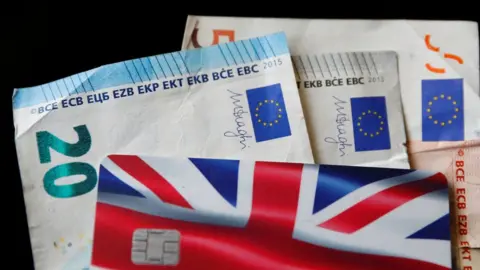 Reuters
ReutersUnveiling the Northern Ireland plans at a press conference, Mr Barnier also attacked the UK over one of the sticking points in the Brexit negotiations - the size of any "divorce" bill required as it leaves the EU.
The UK has said it will honour its financial commitments but also that it has a "duty to our taxpayers" to "rigorously" examine the EU's demands.
Mr Barnier said Brussels expected Britain to deliver on commitments made in the multi-year EU budget signed up to by David Cameron and approved by the Westminster Parliament.
"I have been very disappointed by the UK position as expressed last week, because it seems to be backtracking on the original commitment of the UK to honour its international commitments, including the commitments post-Brexit," he said.
"Every euro spent has a specific legal base," he added.
"There is a moral dilemma here. You can't have 27 paying for what was decided by 28. What was decided by the 28 member states has to be borne out by 28 member states, right up to the end. It's as simple as that."
Minister's 'lack of involvement' questioned
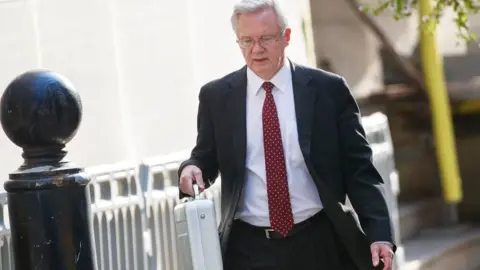 AFP/Getty
AFP/GettyMr Barnier was also asked about comments which have emerged by European Commission president Jean-Claude Juncker about Brexit Secretary David Davis.
In newly-published minutes of a 12 July meeting between Mr Juncker and Mr Barnier, Mr Juncker was recorded as questioning the "stability and accountability" of Mr Davis.
Mr Juncker also said Mr Davis's "apparent lack of involvement... risked jeopardising the success of the negotiations".
In the meeting, which came after the first round of negotiations, Mr Barnier was recorded as saying the UK negotiating strategy involved "using past debts as a means of buying future access to parts of the single market, something which the Union could not accept".
Mr Barnier brushed off the comments at a Brussels press conference, insisting he had "cordial" relations with the Brexit secretary and praising his "professionalism".
And the Department for Exiting the European Union responded: "These are clearly out-of-date comments and it is abundantly clear that the secretary of state has been fully engaged and involved throughout the discussions, in the same way as Mr Barnier."
Parma ham or spam?
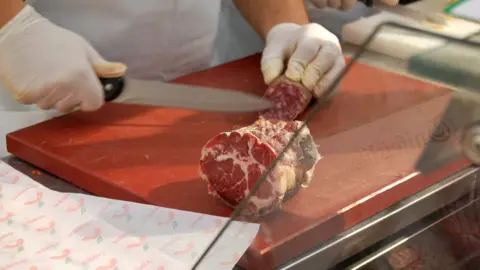
In another position paper from the EU, it called for the UK to continue to honour the protected legal status given to delicacies like Parma ham or Champagne after Brexit.
The European Commission first acted in 1992 to establish a list of products which could only be described by their place of origin if they really were produced in that place.
It also includes UK products like Cornish clotted cream, Dorset Blue cheese, and Jersey Royal potatoes.
Under the EU's intellectual property proposals, the UK would implement the "necessary domestic legislation providing for their continued protection".
The impact of Brexit on food was also considered in the House of Commons, where Labour's Jenny Chapman warned against imposing tariffs on European food imports, and asked whether the government was planning a "return to consuming Spam and tinned peaches".
Brexit Minister Steve Baker assured her this was not the case and described her comments as a "fantastical proposal".
